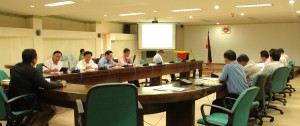
Twelve development officials from the Lao People’s Democratic Republic recently visited Barangay Paliparan III in Dasmariñas, Cavite and interacted with key officials and staff of the Department of Social Welfare and Development (DSWD) to learn more about the Kapit-Bisig Laban sa Kahirapan Comprehensive and Integrated Delivery of Social Services-National Community-Driven Development Program (KALAHI CIDSS-NCDDP), one of its poverty alleviation programs.
The learning visit, which was held on October 30, was facilitated by Paibare, Inc., a faith-based organization.
According to them, KALAHI CIDSS-NCDDP was identified as the development program that will be studied by the delegation because of their interest in Philippine social development.
KALAHI CIDSS-NCDDP uses the community-driven development (CDD) strategy to train and empower citizens to become involved in local development through their active participation in the identification of their community’s most pressing problems, as well as in the implementation and management of their chosen solution to their identified concern.
Primarily reaching rural poor communities, the program began its urban CDD pilot in 2012 through a $3 million grant from the Japan Social Development Fund-Livelihood Opportunities for Vulnerable Urban Communities (JSDF-LVUC).
The grant is intended to help support the urban poor through the provision of livelihood trainings, as well as in infrastructure sub-projects that would address the most pressing needs of targeted communities.
Brgy. Paliparan III is one of the 69 communities included in the urban CDD rollout through the partnership between KALAHI CIDSS-NCDDP and JSDF-LVUC.
The Laos delegation expressed surprise that all 78 livelihood training graduates in Barangay Paliparan III were either already working here or abroad, or had jobs awaiting them. The trainings in refrigerator and air conditioner (RAC) servicing, dressmaking, and consumer electronic servicing amounted to P1,199,521 and were conducted by the Technical Education and Skills Development Authority (TESDA).
The community is currently preparing for the second set of trainings in RAC servicing and dressmaking, amounting to P1,106,950, also through the partnership between KALAHI CIDSS-NCDDP and TESDA.
Aside from the livelihood trainings, the community was able to de-clog and improve their line canal through KALAHI CIDSS-NCDDP, a sub-project that cost P2,055,000. They are also in the process of constructing a barangay health station amounting to P1,140,000.
According to Charina David, one of the KALAHI CIDSS-NCDDP Community Volunteers in the barangay, they chose the construction of a health station because of the high tuberculosis incidence in the community, which is why the said infrastructure came with a sputum.
The delegation also expressed their interest in the governance and finance aspects of the program.
According to Saylom Keoviphakones, the group’s interpreter, the Laos delegation hopes to get more information about KALAHI CIDSS-NCDDP by contacting the program staff and officials about it.
For his part, Jojo Aguilar, one of the Deputy National Program Managers of KALAHI CIDSS-NCDDP, said that that they are willing to address any inquiries they have about the program. He also expressed his gratitude to the Laos delegation for choosing KALAHI CIDSS-NCDDP as one of the programs they studied during their week-long visit to the Philippines.
KALAHI CIDSS-NCDDP is the expansion into a national scale of operations of CDD approach, which was tried and proven effective by Kapit-Bisig Laban sa Kahirapan-Comprehensive and Integrated Delivery of Social Services (Kalahi-CIDSS). It targets the coverage of 847 of the poorest municipalities in the country.
CDD puts power back in the hands of the people by giving them the opportunity to make informed decisions on locally identified options for development and manage resources to implement sub-projects that address needs identified by communities themselves.
For more information about KALAHI CIDSS-NCDDP, please visit http://ncddp.dswd.gov.ph.###


